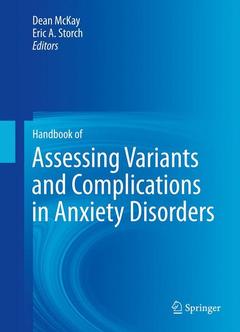Handbook of Assessing Variants and Complications in Anxiety Disorders, 2013
Coordonnateurs : McKay Dean, Storch Eric A.

The Handbook of Assessing Variants and Complications in Anxiety Disorders assembles current findings on assessment methods and applies them to common complicating factors, including comorbid personality and behavioral problems. Chapters examine innovative approaches to assessment of anxiety in children and adults, provide leading insights into timely topics (e.g., school refusal, self-injurious behaviors), and analyze strengths and weaknesses of widely used assessment tools. In clarifying the assessment process, contributors give readers a clear perspective on choosing treatment options in keeping with the trend toward targeted, evidence-based practice, and pinpoint needs for further research. The Handbook's coverage spans the anxiety spectrum, including areas such as:
- Assessment of social and generalized anxiety disorder.
- Neuropsychological assessment of obsessive-compulsive disorder.
- Intelligence testing and treatment planning with children.
- Assessment of substance abuse and dependence in anxiety disorders.
- Personality disorder assessment in clients with anxiety disorders.
- Functional assessment of comorbid and secondary disorders: identifying conditions for primary treatment.
The Handbook of Assessing Variants and Complications in Anxiety Disorders is an essential reference for researchers, scientist-practitioners, and graduate students in clinical child, school, and developmental psychology; social work; psychiatry; psychotherapy; counseling; and pediatrics. And its companion volume, the Handbook of Treating Variants and Complications in Anxiety Disorders, translates these findings to the next stage of care.
Dean McKay, Ph.D., ABPP, is Professor, Department of Psychology, Fordham University. He currently serves on the editorial boards of Behaviour Research and Therapy, Behavior Modification, Behavior Therapy, and Journal of Anxiety Disorders and is Editor-in-Chief of Journal of Cognitive Psychotherapy. Dr. McKay is President-elect of the Association for Behavioral and Cognitive Therapies (Presidential term 2013-2014). He has published more than 130 journal articles and book chapters and has more than 150 conference presentations. He is Board Certified in Behavioral and Clinical Psychology of the American Board of Professional Psychology (ABPP), and is a Fellow of the American Board of Behavioral Psychology and the Academy of Clinical Psychology. He is also a Fellow the American Psychological Society. Dr. McKay has edited or co-edited eight books dealing with treatment of complex cases in children and adults, obsessive-compulsive disorder, disgust in psychopathology, and research methodology. His research has focused primarily on Obsessive-Compulsive Disorder (OCD), Body Dysmorphic Disorder, and Hypochondriasis and their link to OCD as well as the role of disgust in psychopathology. His research has also focused on mechanisms of information processing bias for anxiety states. Dr. McKay is also director and founder of Institute for Cognitive Behavior Therapy and Research, a private treatment and research center in Westchester County, New York.
Eric A. Storch, Ph.D., is Professor and All Children’s Hospital Guild Endowed Chair in the Departments of Pediatrics and Psychiatry & Behavioral Neurosciences, University of South Florida. He holds a joint appointment in the Department of Psychology. He is Associate Editor for three journals: Child Psychiatry and Human Development, Journal of Cognitive Psychotherapy, and Journal of Obsessive-Compulsive and Related Disorders, and serves on the editori
Examines unique factors that may differentially impact children and adults with anxiety
Discusses assessment strategies for youth with ASD and co-occurring anxiety
Provides a how-to guide for dealing with common issues that may complicate assessment
Offers strategies for conditions often ruled out for inclusion in treatment trials evaluating effectiveness of therapy
Includes supplementary material: sn.pub/extras
Date de parution : 03-2013
Ouvrage de 255 p.
17.8x25.4 cm
Disponible chez l'éditeur (délai d'approvisionnement : 15 jours).
Prix indicatif 242,64 €
Ajouter au panierThèmes de Handbook of Assessing Variants and Complications in... :
Mots-clés :
Attention deficit hyperactivity disorder; Autism spectrum disorder; Cognitive-behavioral therapy; Diagnostic and Statistical Manual-IV-TR; Differential diagnosis; Disruptive behavior disorders; Functional assessment; Generalized anxiety disorder; Neuropsychological evaluation; Obsessive-compulsive disorder; Overvalued ideation; Posttraumatic stress disorder; Psychotherapy; School refusal; Selective mutism; Social phobia; Substance abuse; Thought disorders



